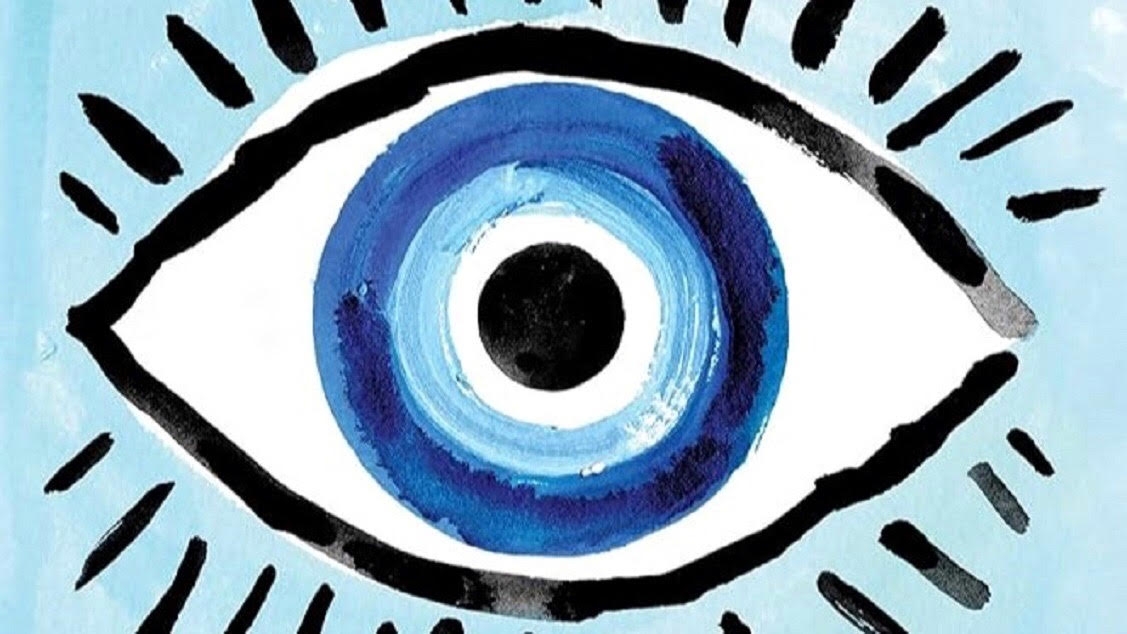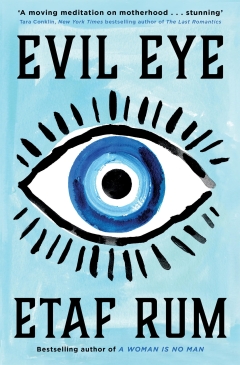Evil Eye: Etaf Rum’s new novel tackles marital trauma, patriarchy and white feminism

One blisteringly hot day, during the summer of 2020, I brought my children out for a refreshing swim at our local pool; while they splashed around and ate Italian ices, I graded papers and enjoyed the sunshine.
Suddenly, out of the corner of my eye, I spotted a woman, nobody I knew, reclining in a lounge chair, completely absorbed in reading A Woman Is No Man, a book by a Palestinian-American author.
I had heard of the novel, of course, as I cheer whenever an Arab-American writer creates a work of literature that breaks through to the mainstream reader.
A Woman Is No Man was Rum’s first novel. It tracked the lives and collective trauma of three generations of Palestinian women, from Palestine to Brooklyn.
I shouldn’t have been surprised that the reader was neither a fellow Arab-American nor a scholar of postcolonial literature, but a mother at a suburban Baltimore neighbourhood pool who was so enthralled by the book that the sound of splashing children failed to distract her.
Stay informed with MEE's newsletters
Sign up to get the latest alerts, insights and analysis, starting with Turkey Unpacked
Rum's debut received a massive amount of attention and was recognised by the American Library Association, The New York Times Book Review, the Washington Post, Newsweek, and other outlets.
It had even been selected as a “Read with Jenna” pick for Today Show co-host Jenna Bush Hager’s book club. Rum herself claims that
Hager’s selection changed her life, as her book shot to the top of the New York Times bestseller list and was adopted by book clubs across the US.
Evil Eye is a beautiful novel about the ways in which past traumas can plague us
That might well be why the mum at the pool had heard about the novel and why she picked it up.
But no matter the reason, the fact that Palestinian stories could attract a mainstream audience was a thrilling observation. The fanfare over A Woman Is No Man was not exaggerated but was in fact richly deserved.
Shortly after that day, I went to my own “to read” shelf, pulled down my own copy, and finished it in three days.
Recently, I repeated that process with Rum’s latest, Evil Eye, a captivating look at a troubled marriage, which goes into the heart and mind of a young Palestinian-American mother grappling with generational trauma.
While many authors struggle with their second effort, Etaf Rum’s talent shines in the pages of this stunning book.
'A deep sadness'
Evil Eye’s protagonist, Yara Murad, feels haunted. On the surface, she appears to be a happy, busy, working mother of two bright daughters, and the wife of Fadi, her handsome and hard-working husband, a man who raves about her cooking and supports her career as a media designer at the local university.
Yet for months, Yara has been waking each day with an unshakably deep sadness, even as she takes her children to school, goes to work, cleans her house until it shines, and cooks elaborate Palestinian meals from scratch.
Her despair is mysterious, and she struggles to analyse it and identify its trigger. It cannot wholly be caused by her mother-in-law, Nadia, a shrewd and piercing woman who frowns upon Yara’s status as a working mother: “Tell me, what could be more important than your family?” Nadia asks her, after lecturing her on how she’s not failing at mothering her children.
Nadia would be an easy villain, but Rum doesn’t let us get away with such a perception as easily as that. Instead, she probes into Nadia as a character, seeking to explain how she became such a hard, unforgiving woman.
For example, Yara herself, the victim of her mother-in-law’s criticism, reflects on Nadia’s background, pondering the trauma she endured as a Palestinian who survived the 1948 Nakba; the catastrophe.
Rum explains that Nadia and her family became refugees, struggling to survive, under Israel’s military occupation.
”Of course, Nadia believed that a woman belonged at home,” she thinks to herself, adding later: “Her mother-in-law had been denied the privilege of a home, so now in this beautiful country, she would be insistent on preserving one.”
So, if Nadia is nothing more than a nuisance, what is causing Yara’s depression?
Could it be her workplace, the university arts department where she is pursuing her dream? Even though she is technically employed as a media design specialist, Yara covets the permission she’s received to teach one section of an introductory arts class – a job that makes her feel alive.
She pours her passion for art into her teaching, exposing students to established creatives but also to ones from non-white backgrounds, such as Lebanese Helen Zughaib and African American Philemona Williamson.
It is in teaching that Yara feels truly fulfilled, and yet, even this pleasure is snatched from her after a racist confrontation with a white co-worker.
'Crazy making'
In what is clearly Rum’s astute critique of middle-class, white feminism, Yara’s co-worker assumes that, as an Arab, Yara must be oppressed and silenced at home; white feminists regularly put non-white women in a bind when they do this, as Rum shows.
Yara feels torn: “She wanted to chase after Amanda, to tell her how she’d finished college despite being a new mother, that Fadi would support her career only if she worked during the girls’ school hours.
“That she was trying to juggle work and motherhood and nightly homemade dinners.[...] But how could Yara convey any of that without furthering the stereotype she knew Amanda believed her to be?”
In fact, Yara utters her own condemnation and insightful analysis of white-centred culture in the US, a culture that imposes an impossible and dangerous beauty standard - one dictated by capitalism and rampant consumerism - on modern women.
This is where Rum excels at presenting a nuanced perspective in an accessible way. She excavates Yara’s pain, a collective wound due to her unhappy marriage, her trauma at being raised by an abusive father, a childhood spent watching her mother suffer, and her own tenuous marriage - and yet, Rum makes it clear that the enemy here is patriarchy, not Palestine.
Yara’s pain is not alleviated by the alleged feminists in her workplace. In fact, they make her feel excluded and isolated in her suffering. The sisterhood touted by second-wave feminists is not real, at least not for women of colour, and Rum makes that plain.
Rum is as much a critic of her Palestinian characters as her American ones. There is a third, clear possibility for Yara’s triggers, her sweet-talking husband, who finds his own mother as annoying as his wife does.
And yet, as the novel unfolds, it becomes clear that Fadi is a harmful, covert narcissist, a man who appears supportive of Yara but actually limits her views and hopes by subverting them to his own wishes.
He indulges in what psychologists might term “crazy-making”. When she tries to explain her sadness to him, as her life feels like it's collapsing around her, Fadi says: “Don’t attack me because of your own insecurity [...] I’m not making you feel [crazy]. You feel that way on your own.”
From many angles, his behaviour resembles that of Yara’s father, who curtailed her own mother’s dreams, though in a more overt way.
Despite its searing look at American and Palestinian patriarchy, Evil Eye is a beautiful novel about the ways in which past traumas can plague us, narrowing our field of vision and threatening our future happiness.
She describes the Israeli military occupation of Palestine, and how this decades-long catastrophe has impacted Palestinian families for generations. Her depictions of life for the older generation, living in refugee camps, are historically accurate and heartbreaking – she is bringing this history too, into the hands of mainstream readers.
While Rum’s pages are brimming with compassion for all her characters, Evil Eye is essentially a novel about one woman’s triumph: Yara inherits her mother’s disappointment, and her hopelessness, but she struggles to break that pattern.
She fights against what she has been taught, specifically that there is “safety in obedience".
I’m grateful for this newest addition to the growing canon of Palestinian American literature.
Evil Eye is published by HarperCollins and is available for sale now
Middle East Eye delivers independent and unrivalled coverage and analysis of the Middle East, North Africa and beyond. To learn more about republishing this content and the associated fees, please fill out this form. More about MEE can be found here.







